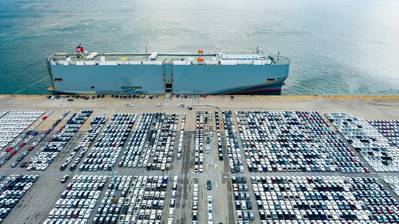Demand for New Car Carriers Surges on China's EV Export Boom
Chinese automakers and shippers are ordering a record number of car-carrying vessels to support a boom in EV exports, data showed, putting China on course to amass the world's fourth-largest fleet by 2028.
China currently has the world's eighth-largest fleet with 33 car-carrying ships, showed data from shipping consultancy Veson Nautical. Japan has the world's largest with 283 ships, followed by Norway's 102, South Korea's 72 and Isle of Man's 61.
But Chinese companies have 47 ships on order, accounting for a quarter of all orders globally. Buyers include SAIC Motor, Chery Automobile and EV giant BYD, as well as shippers such as COSCO and China Merchants on behalf of Chinese automakers.
"After this armada has been delivered to China, the Chinese controlled car carrier fleet will jump from current 2.4% to 8.7%," Veson analyst Andrea de Luca said. "We expect to see new trade routes established almost exclusively for Chinese OEMs (automakers)."
The jump in orders has mostly benefited Chinese shipyards, which received 82% of orders globally, the data showed.
With price-squeezing competition, cost-conscious consumers and a sluggish economy, automakers have ramped up expansion into markets where their vehicles command higher prices than at home. Last year, China overtook Japan as the biggest auto exporter.
BYD alone exported over 240,000 cars in 2023, about 8% of its global sales, and plans to export up to 400,000 this year.
Foreign peers such as Tesla TSLA.O and Volkswagen VOWG_p.DE have also expanded production in China for export to take advantage of the country's cost-effective supply chain.
Rising shipping costs and local government support have persuaded automakers to buy ships themselves. By the end of 2023, the daily rate to charter a 6,500-vehicle carrier reached $115,000, more than seven times the 2019 average, showed data from shipping consultancy Clarkson.
But the export rise has prompted the U.S. and EU to accuse China of trying to deal with excess industrial capacity by flooding their markets with low-priced products.
The government said the focus on capacity is misguided and that it understates innovation and overstates the role of state support in driving growth.
The risk of excess capacity is also high in shipbuilding, said senior economist Xu Tianchen at the Economist Intelligence Unit, with China the usual target of finger-pointing.
However, "there remain some niches where the market probably hasn't saturated, such as car cargo ships," Xu said.
U.S. Treasury Secretary Janet Yellen raised overcapacity concerns during a four-day trip to China. Meanwhile, China's Minister of Commerce Wang Wentao is visiting Europe, where he is likely to discuss a European Commission probe into whether Chinese-made EVs unfairly benefit from subsidies.
(Reuters - Reporting by Sarah Wu, Brenda Goh and Zhang Yan; Editing by Christopher Cushing)















